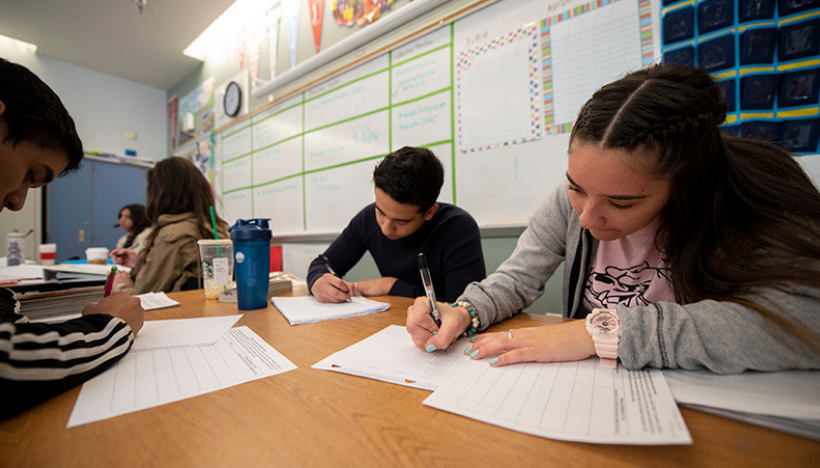This post is written by member Peg Grafwallner.
As NCTE’s National Day on Writing approached, I wasn’t quite sure how I wanted to celebrate it. I knew I wanted to mark the occasion, but how?
I could send out a survey and ask teachers to share the #WhyIWrite statement with students, garner their responses, and then analyze them, or . . .
I could ask teachers to respond to the #WhyIWrite statement at our next PLC and gather their responses to share at the next meeting, or . . .
I could ask my principal to make a morning announcement requesting students and teachers respond to the prompt, gather their answers, and write up a summary.
Then I realized I was missing the point. This was not meant to be an anonymous survey, a professional development directive, or a principal’s mandate. It was meant to be a celebration of writing; whatever writing means to you. It was meant to embrace how our writing shapes who we are, our work, and ultimately, our lives.
I decided to share the celebration with students and teachers in a very unscientific way: I randomly walked up to individuals in the hallway, in their classrooms, in the library, and jotted down their responses to the question “Why do you write?” However, prior to asking the question, I encouraged them not to “think about it, but tell me the first thing that pops into your mind.” I didn’t want to define the word writing, but rather, let the respondent decide what writing means to him/her.
In no particular order, here are the responses:
Teachers/Staff/Administrator
- “For the challenge.”—Steve M. (librarian)
- “To communicate.”—Brent S. (computer science teacher)
- “Because I have to.”—April N. (special education teacher)
- “To express what I can’t verbally to other people.”—Oscar S. (English teacher)
- “Because I have to.”—Teri K. (French teacher)
- “Because it releases stress.”—DeRonda M. (school safety teacher)
- “For fun.”—Mike M. (math teacher and department chairperson)
- “Writing gives me time to think.”—Mike R. (principal)
- “I want to clearly communicate my thoughts.”—Adam M. (music teacher)
- “To communicate and express emotions.”—Gary DP. (physical education teacher)
Students
- “To express something.”—Daniel M. (senior)
- “I need to.”—Celeste D. (junior)
- “’Cause they tell me to.”—Laylah O. (sophomore)
- “Because it’s necessary.”—Obinna A. (sophomore)
- “To express feelings.”—Amareyna K. (ninth grader)
- “Because I write to get out emotional feelings through fictional characters.”—Valerie B. (junior)
- “I like to get out my emotions and think.”—Brianna M. (ninth grader)
- “I enjoy creating characters that can do what I can’t do.”—Matthew V. (sophomore)
- “Because I can express what I’m thinking.”—Thalicia M. (ninth grader)
- “To express myself.”—Jimmy S. (senior)
These responses made me realize that while some people thought of writing as a chore (April N. commented, “I’m not a good writer. I’ve always hated writing book reports and essays”), others felt the “need” to write to share expression; almost as if it were beyond their control.
NCTE’s National Day on Writing was a success. I didn’t need a survey or a PLC or a morning announcement to appreciate that all of us have distinct feelings about writing and sharing ourselves with each other. But what makes the National Day on Writing so important is that it brings to light our mutual desire to be heard, to be validated, and ultimately, to be embraced.
 Peg Grafwallner is an instructional coach and reading specialist at a large urban high school. Peg draws on her nearly 24 years of experience and expertise to focus on engagement, motivation, and interventions to create student opportunities of learning and inquiry. Contact Peg at www.peggrafwallner.com or on Twitter at @peggrafwallner.
Peg Grafwallner is an instructional coach and reading specialist at a large urban high school. Peg draws on her nearly 24 years of experience and expertise to focus on engagement, motivation, and interventions to create student opportunities of learning and inquiry. Contact Peg at www.peggrafwallner.com or on Twitter at @peggrafwallner.

